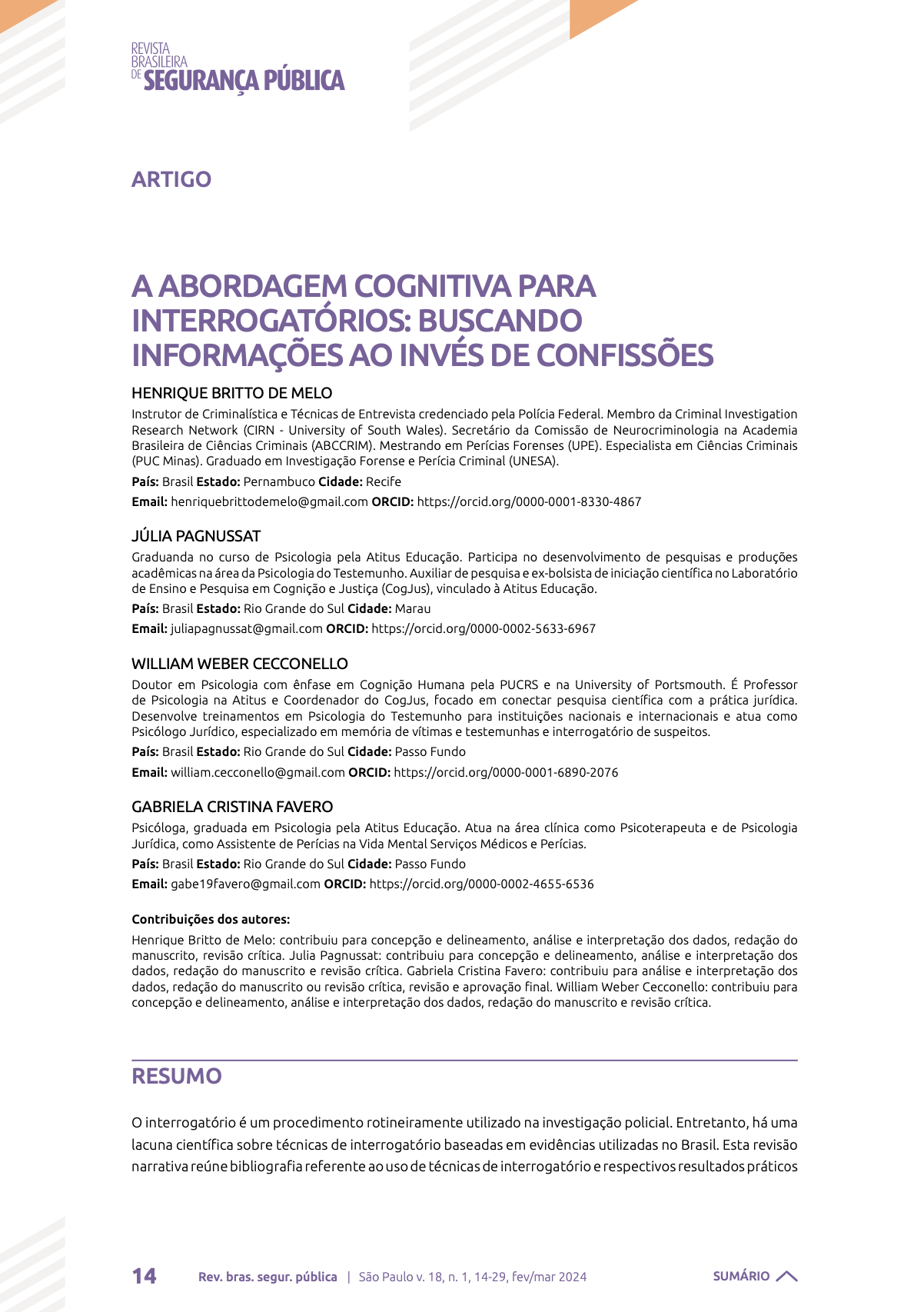The cognitive approach to interrogation
looking for information instead of confessions
DOI:
https://doi.org/10.31060/rbsp.2024.v18.n1.1710Keywords:
Police interrogation, Accusatorial approach, False confessions, Information-gathering, RapportAbstract
Suspect interrogation is a routine procedure used in police investigation. However, there is a gap in the scientific literature regarding evidence-based interview techniques in Brazil. This narrative review gathers bibliography regarding the use of interrogation techniques and their efficacy. First, the accusatorial approach is analyzed, which is a method that uses stress induction on the suspect to analyze alleged lie indicators, and to obtain a confession. Studies from cognitive psychology show that the accusatorial approach generates information of low reliability and can also result in false confessions. As an alternative to the accusatorial approach, we propose the information-gathering approach, which focuses on cooperation with the suspects and aims to encourage them to talk without using coercion. At the end, we explain how cognitive psychology helped make interviewing practices more effective in other countries, suggesting possible paths for Brazil.
Downloads
References
ABBE, Allison; BRANDON, Susan. The role of rapport in investigative interviewing: a review. Journal of Investigative Psychology and Offender Profiling, v. 10, n. 3, 2013. DOI: https://doi.org/10.1002/jip.1386
ABREU, Debora Pacheco; CECCONELLO, William Weber; STEIN, Lilian Milnitsky; BULL, Ray. Interviewing suspects practices in Brazil. Investigative Interviewing Research & Practice, v. 12, n. 1, p. 40-52, 2022.
ALISON, Laurence; ALISON, Emily; NOONE, Geraldine; ELNTIB, Stamaris; CHRISTIANSEN, Paul. Why tough tactics fail and rapport gets results: Observing Rapport-Based Interpersonal Techniques (ORBIT) to generate useful information from terrorists. Psychology, public policy, and law, v. 19, n. 4, p. 411-431, 2013. DOI: https://doi.org/10.1037/a0034564
ASK, Karl; GRANHAG, Pär Anders. Motivational sources of confirmation bias in criminal investigations: the need for cognitive closure. Journal of Investigative Psychology and Offender Profiling, v. 2, n. 1, p. 43-63, 2005. DOI: https://doi.org/10.1002/jip.19
BOND JR., Charles; DEPAULO, Bella. Accuracy of deception judgments. Personality and Social Psychology Review, v. 10, n. 3, p. 214-234, 2006. DOI: https://doi.org/10.1207/s15327957pspr1003_2
CHAPMAN, Frances Elizabeth. A recipe for wrongful confessions: a case study examining the “Reid technique” and the interrogation of indigenous suspects. Michigan State International Law Review, v. 28, n. 3, p. 369-438, 2019.
CHARMAN, Steve; KAVETSKI, Melissa; MUELLER, Dana Hirn. Cognitive Bias in the legal system: police officers evaluate ambiguous evidence in a belief-consistent manner. Journal of Applied Research in Memory and Cognition, v. 6, n. 2, p. 196-202, 2017. DOI: https://doi.org/10.1016/j.jarmac.2017.02.001
DENAULT, Vincent; PLUSQUELLEC, Pierrich; JUPE, Louise; ST-YVES, Michel; DUNBAR, Norah; HARTWIG, Maria; SPORER, Siegfried; RIOUX-TURCOTTE, Jessica; JARRY, Jonathan; WALSH, Dave; OTGAAR, Henry; VIZITEU, Andrei; TALWAR, Victoria; KEATLEY, David; BLANDÓN-GITLIN, Iris; TOWNSON, Clint; DESLAURIERS-VARIN, Nadine; LILIENFELD, Scott; PATTERSON, Miles; AREH, Igor; ALLAN, Alfred; CAMERON, Hilary Evans; BOIVIN, Rémi; BRINKE, Leanne; MASIP, Jaume; BULL, Ray; CYR, Mireille; HOPE, Lorraine; STRÖMWALL, Leif; BENNETT, Stephanie; MENAIYA, Faisal Al; LEO, Richard; VREDEVELDT, Annelies; LAFOREST, Marty; HONTS, Charles; MANZANERO, Antonio; MANN, Samantha; GRANHAG, Pär Anders; ASK, Karl; GABBERT, Fiona; GUAY, Jean-Pierre; COUTANT, Alexandre; HANCOCK, Jeffrey; MANUSOV, Valerie; BURGOON, Judee; KLEINMAN, Steven; WRIGHT, Gordon; LANDSTRÖM, Sara; FRECKELTON, Ian; VERNHAM, Zarah; KOPPEN, Peter J. van. The analysis of nonverbal communication: the dangers of pseudoscience in security and justice contexts. Anuário de Psicología Jurídica, v. 30, n. 1, p. 1-12, 2020.
DOCAN-MORGAN, Tony. The palgrave handbook of deceptive communication. Cham, Switzerland: Palgrave Macmillan, 2019. ISBN: 9783319963334. DOI: https://doi.org/10.1007/978-3-319-96334-1
ERCOLE, Flávia Falci; MELO, Laís Samara; ALCOFORADO, Carla Lúcia Goulart Constant. Revisão integrativa versus revisão sistemática. Revista Mineira de Enfermagem, v. 18, n. 1, p. 9-12, 2014. DOI: https://doi.org/10.5935/1415-2762.20140001
FAHSING, Ivar. The making of an expert detective: thinking and deciding in criminal investigations. Tese (Doutorado em Psicologia Forense) – Departamento de Psicologia, Universidade de Gotemburgo, Suécia. 2016.
FAHSING, Ivar; ASK, Karl. Decision making and decisional tipping points in homicide investigations: an interview study of british and norwegian detectives. Journal of Investigative Psychology and Offender Profiling, v. 10, n. 2, p. 155-165, 2013. DOI: https://doi.org/10.1002/jip.1384
FAHSING, Ivar; ASK, Karl. The making of an expert detective: the role of experience in english and norwegian police officers’ investigative decision-making. Psychology, Crime & Law, v. 22, n. 3, p. 203-223, 2016. DOI: https://doi.org/10.1080/1068316X.2015.1077249
FBI – Federal Bureau of Investigation. High-Value Detainee Interrogation Group. Interrogation best practices. 2016a.
FBI – Federal Bureau of Investigation. High-Value Detainee Interrogation Group. Interrogation: a review of the science. 2016b.
GEISELMAN, R. Edward. The cognitive interview for suspects (CIS). American College of Forensic Psychology, v. 30, n. 3, p. 5-20, 2012.
GRANHAG, Pär Anders; HARTWIG, Maria. The strategic use of evidence technique: a conceptual overview. In: GRANHAG, Pär Anders; VRIJ, Aldert; VERSCHUERE, Bruno (Eds.). Detecting deception: current challenges and cognitive approaches. EUA: John Wiley & Sons, 2015, (p. 231–251). DOI: https://doi.org/10.1002/9781118510001.ch10
GRIFFITHS, Andy; MILNE, Rebecca. The psychology of criminal investigation: from theory to practice. Abingdon, Oxon; New York, NY: Routledge, 2018. ISBN: 9781138639416. DOI: https://doi.org/10.4324/9781315637211
GROOME, David; EYSENCK, Michael. An introduction to applied cognitive psychology. Psychology Press, 2016. ISBN: 9781138840133. DOI: https://doi.org/10.4324/9781315732954
HARTWIG, Maria; GRANHAG, Pär Anders; LUKE, Timothy. Strategic use of evidence during investigative interviews: the state of the science. In: RASKIN, David; HONTS, Charles; KIRCHER, John. Credibility Assessment. Academic Press, 2014, p. 1-36. ISBN: 9780123944337. DOI: https://doi.org/10.1016/B978-0-12-394433-7.00001-4
HAUCH, Valerie Hauch; SIEGFRIED, Ludwig Sporer; MICHAEL, Stephen; MEISSNER, Christian. Does training improve the detection of deception? A meta-analysis. Communication Research, v. 43, n. 3, p. 283-343, 2016. DOI: https://doi.org/10.1177/0093650214534974
HRITZ, Amelia Courtney; ROYER, Caisa Elizabeth; HELM, Rebecca; BURD, Kayla; OJEDA, Karen; CECI, Stephen. Children’s suggestibility research: things to know before interviewing a child. Anuário de Psicología Jurídica, v. 25, n. 1, p. 3-12, 2015. DOI: https://doi.org/10.1016/j.apj.2014.09.002
IACONO, William; BEN-SHAKHAR, Gershon. Current status of forensic lie detection with the comparison question technique: an update of the 2003 National Academy of Sciences report on polygraph testing. Law and Human Behavior, v. 43, n. 1, p. 86-98, 2019. DOI: https://doi.org/10.1037/lhb0000307
INBAU, Fred Edward; BUCKLEY, Joseph; REID, John; JAYNE, Brian. Essentials of the Reid Technique: criminal interrogation and confessions. Burlington, MA: Jones & Bartlett Learning, 2013. ISBN: 978-1-4496-9110-3.
KASSIN, Saul. On the psychology of confessions: does innocence put innocents at risk?. American Psychologist, v. 60, n. 3, p. 215-228, 2005. DOI: https://doi.org/10.1037/0003-066X.60.3.215
KASSIN, Saul. False confessions. Wiley Interdisciplinary Reviews: Cognitive Science, v. 8, n. 6, e1439, 2017. DOI: https://doi.org/10.1002/wcs.1439
KOZINSKI, Wyatt. Issue 2 Part of the Law Commons Recommended Citation Recommended Citation Kozinski. Seattle Journal for Social Justice Seattle Journal for Social Justice, v. 16, n. 2, p. 10, 2018.
LOURENÇO, Aline de Araújo; SILVA, Erick Simões da Camara. Considerações sobre as condenações injustas fundamentadas em provas periciais: análise do Innocence Project, do National Registry of Exoneration, e mecanismos para redução de erros periciais. Revista Brasileira de Direito Processual Penal, v. 7, n. 1, p. 567-607, 2021. DOI: https://doi.org/10.22197/rbdpp.v7i1.410
MACDONALD, Sarah; SNOOK, Brent; MILNE, Rebeca Jane. Witness interview training: a field evaluation. Journal of Police and Criminal Psychology, v. 32, n. 1, p. 77-84, 2017. DOI: https://doi.org/10.1007/s11896-016-9197-6
MAY, Lennart; GEWEHR, Elsa; ZIMMERMANN, Johannes; RAIBLE, Yonna; VOLBERT, Renate. How guilty and innocent suspects perceive the police and themselves: suspect interviews in Germany. Legal and Criminological Psychology, v. 26, n. 1, p. 42-61, 2021. DOI: https://doi.org/10.1111/lcrp.12184
MEISSNER, Christian; KELLY, Christopher; WOESTEHOFF, Skye. Improving the effectiveness of suspect interrogations. Annual Review of Law and Social Science, v. 11, n. 1, p. 211-233, 2015. DOI: https://doi.org/10.1146/annurev-lawsocsci-120814-121657
MILLER, Jeaneé; REDLICH, Allison; KELLY, Christopher. Accusatorial and information-gathering interview and interrogation methods: a multi-country comparison. Psychology, Crime & Law, v. 24, n. 9, p. 935-956, 2018. DOI: https://doi.org/10.1080/1068316X.2018.1467909
MOSCATELLI, Lívia Yuen Ngan. Considerações sobre a confissão e o método Reid aplicado na investigação criminal. Revista Brasileira de Direito Processual Penal, v. 6, n. 1, p. 361-394, 2020. DOI: https://doi.org/10.22197/rbdpp.v6i1.331
MYKLEBUST, Trond; BJØRKLUND, Ronald. The effect of long-term training on police officers’ use of open and closed questions in Field Investigative Interviews of Children (FIIC). Journal of Investigative Psychology and Offender Profiling, v. 3, n. 3, p. 165-181, 2006. DOI: https://doi.org/10.1002/jip.52
NAHARI, Galati; VRIJ, Aldert; FISHER, Ronald. The verifiability approach: countermeasures facilitate its ability to discriminate between truths and lies. Applied Cognitive Psychology, v. 28, n. 1, p. 122-128, 2014. DOI: https://doi.org/10.1002/acp.2974
O’NEILL, Desmond. From third-degree to third-generation interrogation strategies: Putting science into the art of criminal interviewing. Dissertação (Mestrado em Estudos de Segurança) – Escola de Pós-Graduação Naval, Monterey/Califórnia, 2017.
OLIVEIRA, Wellington de. Aplicando técnicas de entrevista e interrogatório na investigação – Método Reid. Portal da Polícia Civil do Estado do Mato Grosso do Sul, [s.d.].
PACELLI, Eugênio. Curso de processo penal. 25 ed. São Paulo: Atlas, 2021. ISBN: 978-85-97-02694-8.
ROBERTS, Karl Anton. Police interviewing of criminal suspects: a historical perspective. Internet Journal of Criminology, 2012. ISSN 2045-6743 [Online].
SCHERR, Kyle C.; REDLICH, Allison D. ; KASSIN, Saul M. Cumulative disadvantage: A psychological framework for understanding how innocence can lead to confession, wrongful conviction, and beyond. Perspectives on Psychological Science, v. 15, n. 2, p. 174569161989660, 2020. DOI: https://doi.org/10.1177/1745691619896608
SPIERER, Ariel. The right to remain a child: the impermissibility of the Reid technique in juvenile interrogations. New York University Law Review, v. 92, n 5, p. 1719-1750, 2017.
SPORER, Siegfried; SCHWANDT, Barbara. Moderators of nonverbal indicators of deception: a meta-analytic synthesis. Psychology, Public Policy, and Law, v. 13, n. 1, p. 1-34, 2007. DOI: https://doi.org/10.1037/1076-8971.13.1.1
SURMON-BÖHR, Frances; ALISON, Laurence; CHRISTIANSEN, Paul; ALISON, Emily. The right to silence and the permission to talk: motivational interviewing and high-value detainees. American Psychologist, v. 75, n. 7, p. 1011-1021, 2020. DOI: https://doi.org/10.1037/amp0000588
SWANNER, Jessica; MEISSNER, Christian; ATKINSON, Dominick; DIANISKA, Rachel. Developing diagnostic, evidence-based approaches to interrogation. Journal of Applied Research in Memory and Cognition, v. 5, n. 3, p. 295-301, 2016. DOI: https://doi.org/10.1016/j.jarmac.2016.07.001
VALLANO, Jonathan; COMPO, Nadja Schreiber. Rapport-building with cooperative witnesses and criminal suspects: a theoretical and empirical review. Psychology, Public Policy, and Law, v. 21, n. 1, p. 85-99, 2015. DOI: https://doi.org/10.1037/law0000035
VICIANOVA, Martina. Historical techniques of lie detection. Europe’s Journal of Psychology, v. 11, n. 3, 2015. DOI: https://doi.org/10.5964/ejop.v11i3.919
VRIJ, Aldert. Baselining as a lie detection method. Applied Cognitive Psychology, v. 30, n. 6, p. 1112-1119, 2016. DOI: https://doi.org/10.1002/acp.3288
VRIJ, Aldert; HOPE, Lorraine; FISHER, Ronald. Eliciting reliable information in investigative interviews. Policy Insights from the Behavioral and Brain Sciences, v. 1, n. 1, p. 129-136, 2014. DOI: https://doi.org/10.1177/2372732214548592
VRIJ, Aldert; FISHER, Ronald; MANN, Samantha; LEAL, Sharon. A cognitive load approach to lie detection. Journal of Investigative Psychology and Offender Profiling, . 5, n. 1-2, p. 39-43, 2008. DOI: https://doi.org/10.1002/jip.82
VRIJ, Aldert; LEAL, Sharon; MANN, Samantha; FISHER, Ronald; DALTON, Gary; JO, Eunkyung; SHABOLTAS, Alla; KHALEEVA, Maria; GRANSKAYA, Juliana; HOUSTON, Kate. Using unexpected questions to elicit information and cues to deceit in interpreter-based interviews. Applied Cognitive Psychology, v. 32, n. 1, p. 94-104, 2018. DOI: https://doi.org/10.1002/acp.3382
WALCZYK, Jeffrey; SEWELL, Nate; DIBENEDETTO, Meghan. A Review of Approaches to detecting malingering in forensic contexts and promising cognitive load-inducing lie detection techniques. Frontiers in Psychiatry, v. 9, artigo 700, 2018. DOI: https://doi.org/10.3389/fpsyt.2018.00700
WALSH, Dave; BULL, Ray. Examining rapport in investigative interviews with suspects: does its building and maintenance work?. Journal of Police and Criminal Psychology, v. 27, n. 1, p. 73-84, 2012. DOI: https://doi.org/10.1007/s11896-011-9087-x
WARMELINK, Lara; VRIJ, Aldert; MANN, Samantha; JUNDI, Shyma; GRANHAG, Pär Anders. The effect of question expectedness and experience on lying about intentions. Acta Psychologica, v. 141, n. 2, p. 178-183, 2012. DOI: https://doi.org/10.1016/j.actpsy.2012.07.011

Published
How to Cite
Issue
Section
License
Copyright (c) 2023 Revista Brasileira de Segurança Pública

This work is licensed under a Creative Commons Attribution 4.0 International License.
Licensing
The Brazilian Journal of Public Security uses the Creative Commons License as a form of licensing for its published works. The license used follows the CC BY 4.0 - Attribution 4.0 International model.
To see the permitted rights please go to the full licence or to our Copyright and Licensing page.


